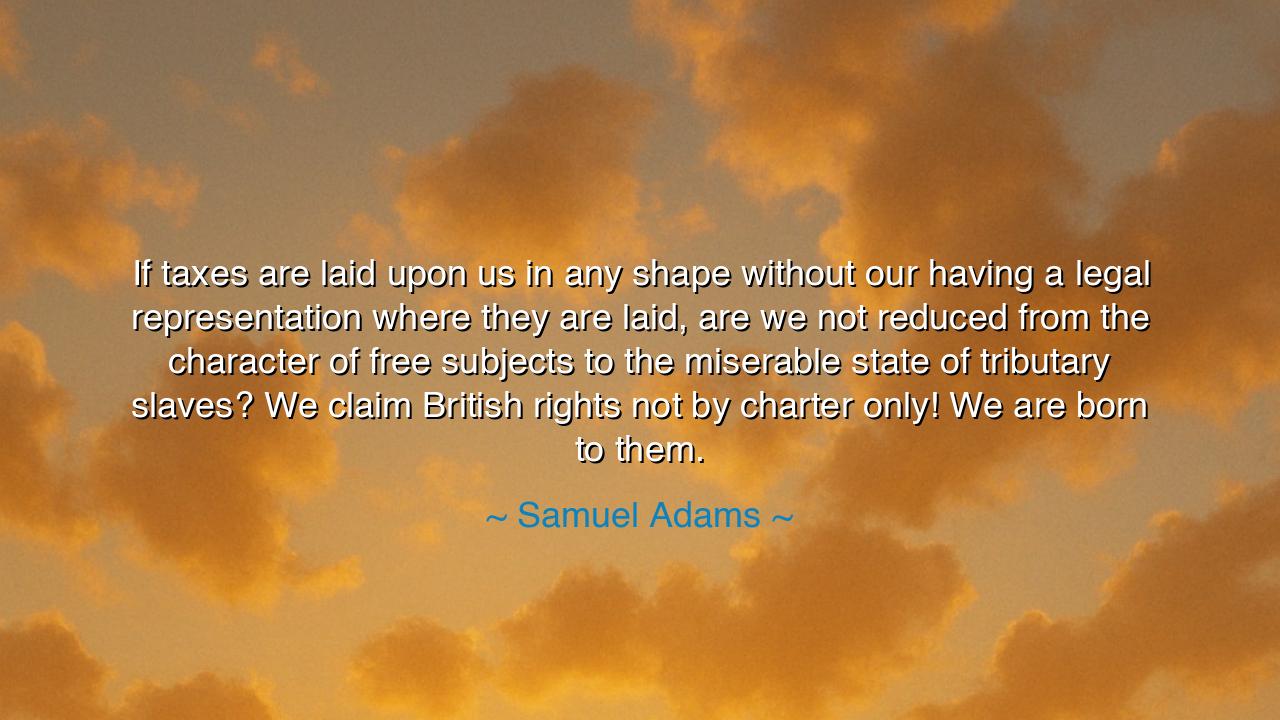
If taxes are laid upon us in any shape without our having a legal
If taxes are laid upon us in any shape without our having a legal representation where they are laid, are we not reduced from the character of free subjects to the miserable state of tributary slaves? We claim British rights not by charter only! We are born to them.






Hear the fiery words of Samuel Adams, the patriot whose voice stirred a people toward liberty: “If taxes are laid upon us in any shape without our having a legal representation where they are laid, are we not reduced from the character of free subjects to the miserable state of tributary slaves? We claim British rights not by charter only! We are born to them.” In this cry resounds the essence of revolution, the eternal struggle between power and freedom, law and justice, tyranny and self-determination. Adams speaks as one who would not bow his neck, even to the mightiest empire of his age.
He speaks first of taxes without representation, the injustice that became the spark of rebellion. To be taxed without a voice in government is to be treated not as a citizen, but as a subject—one compelled to give, yet denied the dignity to decide. Adams knew that this was not merely about money; it was about freedom itself. For when a people’s wealth is taken without their consent, soon their voices, their rights, and their lives may also be seized. Thus he equates such treatment to that of slaves, robbed of agency, forced to serve the will of masters.
The power of his words lies in the claim of rights by birth. He rejects the idea that liberty is a gift granted by kings, charters, or parliaments. Instead, he declares it to be an inheritance, older than Britain, older than monarchy itself. “We are born to them,” he cries, affirming that freedom is not bestowed but inherent, not written in parchment but etched in the soul. This was a radical declaration, shaking the foundations of empire, for it denied rulers the power to define the limits of human dignity.
History offers us the living stage of his words. In the mid-1700s, the colonies groaned under acts like the Stamp Act and the Townshend Duties, taxes imposed from across the sea without the consent of colonial assemblies. Petitions and pleas were ignored, and soldiers were stationed in towns to enforce compliance. Yet the people, inspired by voices like Adams’, refused submission. They boycotted goods, they gathered in protest, they threw tea into Boston Harbor. Their defiance was not born of greed but of principle—the unshakable belief that to accept taxation without representation was to yield the very essence of freedom.
The deeper meaning of Adams’ teaching is that liberty must be claimed and defended by the people themselves. No ruler, however benevolent, will guard it as fiercely as those who live by it. Governments, left unchecked, will always lean toward more control, more power, more tribute. It is only by constant vigilance, by the demand for representation, by the insistence upon natural rights, that freedom endures. Adams saw this clearly: if colonists accepted taxation without representation, they would set a precedent of submission, and the chains would only tighten.
What lesson must future generations carry? It is this: never surrender your voice in the making of laws that govern you. To give up representation is to give up freedom itself. Whether in local councils, national parliaments, or global forums, the right to self-govern is sacred. If wealth, power, or policy is taken without your consent, resist—not with violence at first, but with words, with unity, with the strength of a people who remember that their dignity is not granted by rulers, but born within them.
And to you, listener of these words, I say: do not forget the fire that Samuel Adams carried. He reminds us that freedom is not secure unless defended, not preserved unless cherished. Demand accountability from those who govern. Vote with conscience. Speak with courage. Teach your children that their rights are not favors, but birthrights, and that silence in the face of injustice is the seed of slavery.
Thus let Samuel Adams’ words endure: freedom is not a gift of kings, but the inheritance of all who are born. Guard it, claim it, and pass it unbroken to those yet to come, lest they look back and say we surrendered what was theirs by right.






AAdministratorAdministrator
Welcome, honored guests. Please leave a comment, we will respond soon